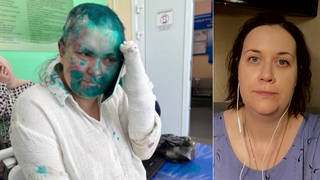
The Nobel Peace Prize was awarded to Russian independent journalist Dmitry Muratov and Filipina journalist Maria Ressa for “their efforts to safeguard freedom of expression.” Muratov runs the independent newspaper Novaya Gazeta, which has lost more journalists to murder than any other Russian news outlet. Katrina vanden Heuvel, editor-in-chief of The Nation and reporter on Russia for the last 30 years, recounts the trajectory of Muratov’s career, noting his newspaper’s humble beginnings and his unexpected rise to becoming an advocate for freedom of the press. “Investigative journalism in Russia today is very dangerous,” says vanden Heuvel. Despite the danger, van Heuvel says that Novaya readership is skyrocketing with younger journalists lining up to work at the newspaper.
Transcript
AMY GOODMAN: This is Democracy Now!, democracynow.org, The War and Peace Report. That was “Stadium Pow Wow,” The Halluci Nation. I’m Amy Goodman.
Two journalists were awarded the Nobel Peace Prize Friday, or the announcement of the award, in recognition for “their efforts to safeguard freedom of expression” and as symbolic of journalists globally fighting to protect press freedom. On Friday, we reported on Maria Ressa, the Filipina investigative journalist, executive editor and founder of the news site Rappler. Today we look at her Nobel Peace Prize co-winner, Dmitry Muratov, the editor-in-chief of the Russian newspaper Novaya Gazeta, which has lost more journalists to murder than any other Russian news outlet. Six of its staff members have been killed since 1993.
For more, we’re joined by Katrina vanden Heuvel, editorial director and publisher of The Nation magazine, columnist for The Washington Post. She’s been reporting on Russia for more than 30 years. Her latest piece in The Nation, “A Courageous Voice for Press Freedom and Independence in Russia.”
Katrina, welcome back to Democracy Now! And condolences on the death of your father.
KATRINA VANDEN HEUVEL: Thank you.
AMY GOODMAN: I wanted to start by talking about this work you’ve been doing for so many decades, and the winner of the — one of the two winners of the Nobel Peace Prize, Dmitry Muratov.
KATRINA VANDEN HEUVEL: So, I and my late husband Stephen Cohen met Dmitry in the cafeteria, the basement cafeteria, of a then-bold glasnost newspaper, Moscow News. He was there with a few colleagues. They wanted to launch an independent, muckraking newspaper. And they had two desks, two computers, and just about that. And they launched. And it is a survival, a testament to the ability to survive if you’re a bold, creative editor, which I knew he was.
What I didn’t understand was how he would become an advocate for freedom of the press against all odds. As you mentioned, Amy, six of his journalists have been killed in the line of duty. One of them, Anna Politkovskaya, was murdered in October 2006, ironically, sadly, just a day before Dima Muratov received the Nobel Prize, in 2006, October 7. What he’s become is — the possibility of doing investigative journalism in Russia today is very dangerous. It’s not just his journalists. There are others who have been killed, Yeltsin era, Putin era. And there’s a culture of impunity, of failure to hold account those who are killing freedom of the press.
On the other hand, Novaya has done some of the best independent, muckraking investigative journalism about abuse of power. They, in fact, covered Putin’s abuses of corruption, the public officials’ corruption — even before Navalny circulated his videos — right-wing extremism. One of their young journalists, Elena Milashina, covered the persecution of the LGBT community in Chechnya. So, it’s a dangerous, very dangerous profession, but Novaya has not only persevered, endured, but has younger journalists wanting to work for it. It has numbers that all of us would envy — about 30 million in social media each month, and 8 to 11 million readers come to its website. The print edition is smaller, but a younger generation is coming to it. So it survives.
And I think this prize will both give it protection but, ironically, will raise the question of foreign funds. We can talk about that, but there has been a trend of repressive media legislation — for example, if you take foreign money, being labeled foreign agent. So, that will be interesting to see what happens. But I suspect this prize, for the most part, will give Novaya more protection than .
AMY GOODMAN: And that point is something Dmitry Muratov raised. Also, your response to those who suggested Alexei Navalny should have been awarded the prize and that Muratov was really a compromise by the Nobel Committee so as not to offend the Kremlin? He himself said Alexei Navalny should have gotten it.
KATRINA VANDEN HEUVEL: So, Alexei Navalny, I think, is — you know, he is an anti-corruption activist. He’s also a political figure. I mean, he received 32% in the Moscow mayoral elections a few years ago. Novaya has covered the persecution of Alexei Navalny, you know, very comprehensive coverage. But I do think Navalny is not — he’s an internet anti-corruption activist, and he also got very involved in the electoral scene in a way that Novaya steps back and reports, has its positions, obviously, but is honest about them. So, I think there should be a calling out of the repression of the Putin administration vis-à-vis journalists, but not attacking Novaya. Novaya has attacked foreign agent labeling, has stood for Navalny’s rights to expose corruption. So I think that is misinformed. And, in fact, I think it’s an attempt to divide those who stand for press freedom — Navalny, Muratov. I will say Muratov is an extraordinary —
AMY GOODMAN: Three seconds.
KATRINA VANDEN HEUVEL: He has retained a sense of humanity and humor. He is giving —
AMY GOODMAN: We’re going to have to leave it there. Katrina vanden Heuvel, thanks so much for joining us. I’m Amy Goodman. This is Democracy Now!













Media Options